The Administration and Development Branch provides various management and support services to the entire Department. These include, staff management and development, financial management, information technology, planning and implementation of capital works projects and public education on environmental hygiene and food safety.
Grade Management
There are three major departmental grades - the Health Inspector grade, the Hawker Control Officer grade and the Foreman grade. There are two grade managers - for Health Inspector and for Hawker Control Officer and Foreman grades. The grade managers are responsible for human resource management matters such as manpower planning, career development, postings, promotions and training.
The Health Inspector grade comprises six ranks - Senior Superintendent, Superintendent, Chief Health Inspector, Senior Health Inspector, Health Inspector I/II and Student Health Inspector. They are responsible for various environmental hygiene and food safety functions, for example, district hygiene, licensing, prosecution, meat inspection, cleansing service, outsourcing, pest control, hawker control, management of markets, cemeteries and crematoria, food control and health education.
The Hawker Control Officer grade comprises five ranks - Principal Hawker Control Officer, Chief Hawker Control Officer, Senior Hawker Control Officer, Hawker Control Officer and Assistant Hawker Control Officer. They are responsible for controlling on-street hawking activities, managing hawker permitted places and taking law enforcement action against illegal hawking activities. They are also empowered to take legal action against offenders committing littering/spitting offences.
The Foreman grade comprises four ranks - Senior Overseer, Overseer, Senior Foreman and Foreman. They are mainly responsible for supervising the work of minor staff in market management, street cleansing, waste collection, pest control, cemeteries and crematoria services as well as monitoring the performance of the Department's contractors. They are also empowered to take legal action against littering and spitting offenders.
Training
Vocational and general training is provided to staff to equip them with the necessary knowledge and skills to carry out their duties, to enhance professionalism and help them gain the pre-requisite qualifications for career advancement. Staff members are provided with in-house programmes, as well as those organised by local institutes and outside Hong Kong. An evaluation system is in place to measure the effectiveness of each programme.
In-house programmes are organised to enhance the functional and core competence of staff. They are mainly designed, administered and conducted by the Department's Training Section.
Local academic institutes are appointed to administer and conduct commissioned programmes. Some of these lead to the award of qualifications which are pre-requisites for career advancement. Also, staff members are sponsored to attend local public programmes whose contents are highly relevant to the Department's work.
Training programmes outside Hong Kong are organised to enhance skills and knowledge in functional competence, when there is difficulty in organising such programmes locally.
Management Services
Management studies and statistical surveys help facilitate the Department in providing efficient and effective public services, in monitoring the standard of quality performance, and in formulating or revising policy.
The Management Services, Survey and Statistics Section, consists of the Management Services Unit and the Survey and Statistics Unit. It is responsible for the provision of management consultancy studies (inclusive of the Business Process Re-engineering (BPR) studies for computerisation projects) and opinion surveys.
The Management Services Unit completed four major review projects during the year on manual street sweeping (village beats), special cleansing, loaders of waste collection and the Ganger grade. A BPR study was also concluded on the Prosecution Results Monitoring System.
The unit also assists departmental clients in implementing recommendations in various review reports, maintains and upgrades the bar-coding file management system to enhance office efficiency, and contributes to the departmental form design.
The Survey and Statistics Unit completed a number of surveys in 2003 on such issues as the Clean Hong Kong Programme, the Provisional Food Business Licences Issue Office and the Restaurant Licensing Seminar.
It compiles an annual statistical report for the Department and offers technical advice to clients on how to undertake statistical surveys and analyse the data collected.
Financial Management
Breakdown of Expenditure by Expenditure Group (Chart)
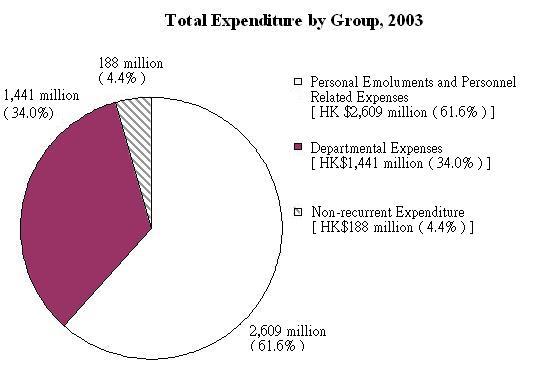
| $M | Percentage | |
|---|---|---|
| Personal Emoluments and Personnel Related Expenses | 2,609 | 61.6% |
| Departmental Expenses | 1,441 | 34.0% |
| Non-recurrent Expenditure | 188 | 4.4% |
Breakdown of Expenditure by Activities (Chart)
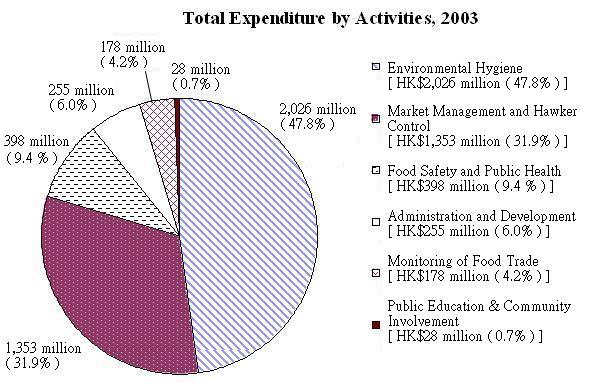
| $M | Percentage | |
|---|---|---|
| Environmental Hygiene | 2,026 | 47.8% |
| Market Management and Hawker Control | 1,353 | 31.9% |
| Food Safety and Public Health | 398 | 9.4% |
| Administration and Development | 255 | 6.0% |
| Monitoring of Food Trade | 178 | 4.2% |
| Public Education & Community Involvement | 28 | 0.7% |
Breakdown of Revenue (Chart)
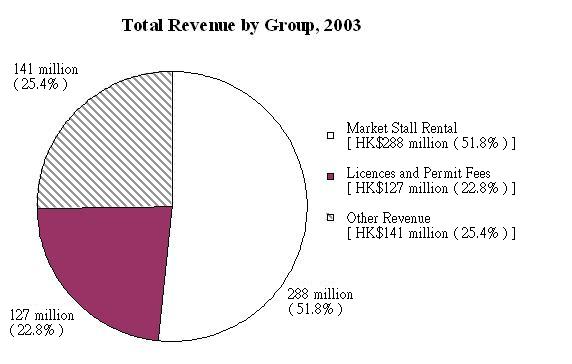
| $M | Percentage | |
|---|---|---|
| Market Stall Rental | 288 | 51.8% |
| Licences and Permit Fees | 127 | 22.8% |
| Other Revenue | 141 | 25.4% |
All matters relating to expenditure and procurement, including payment processing, financial advice and monitoring, are handled by the Finance and Supplies Division.
In 2003, the Department spent $4,238 million, including $2,609 million on salaries and allowances and personnel related expenses, $1,441 million on departmental expenses and $188 million on non-recurrent expenditure.
By activities, the majority of the expenditure ($2,026 million) was spent on environmental hygiene. This was followed by $1,353 million for market management and hawker control, $398 million for food safety and public health, $255 million for administration and development, $178 million for monitoring the food trade, and $28 million for public education and community involvement.
In 2003, the Department received revenue of $556 million. The majority of revenue came from the rent of some 12,000 stalls in markets managed by the Department ($288 million) and from licence and permit fees ($127 million). Other sources included fees for cemeteries and crematoria services ($64 million), fees for meat examination ($29 million) and other miscellaneous services ($48 million).
Information Technology
The Department uses information technology (IT) extensively to provide high quality services to the public. In 2003, the computer system used to support the implementation of the Fixed Penalty (Public Cleanliness Offences) Ordinance was upgraded to cope with changes in the legislation. Another computer system for tracking the performance of contractors was extended from the original scope of public cleansing services to other outsourced contracts, including market and hawker bazaar cleansing, building cleansing, security guard services, pest control, cemeteries and crematoria services, and transport.
Internally, the Department achieved higher productivity and efficiency by using more IT applications. More computer workstations were installed to assist staff and other computers were upgraded to be compatible with the latest technology. Network infrastructure was improved to keep pace with the increasing use of computers. A departmental intranet service was launched, which is gradually evolving into an up-to-date electronic information centre for staff. A departmental IT security review was completed, resulting in the release of an IT security policy for the Department. Most of the public forms issued by the Department are now available on the web site (www.fehd.gov.hk). In addition, new computer systems were implemented to assist with the maintenance and workflow of residue testing of animals, the green management of office environment, and the processing of applications under the voluntary retirement scheme.
Looking ahead, a number of IT initiatives are being planned or implemented. The hardware and software of the hawker licence system, food business licences and restricted food permits system, and the personnel management system will be upgraded to provide new functions and to enhance efficiency. The maintenance of test results for food samples collected will be automated to aid analysis of food safety issues, risk assessment and handling food crises. The leave application and processing system will be improved to achieve on-line leave applications. The collection, collation and preparation of statistical reports are being automated; and a departmental portal is being developed to provide a single entry point to access government-wide electronic applications.
Capital Works
In the Government's 2003 Capital Works Resource Allocation Exercise, the five-year allocation on food and environmental hygiene services capital projects is estimated at $2,100 million. Of the total allocation, about $1,100 million is to meet expenditure for projects under construction or completed with outstanding accounts, while $1,000 million has been earmarked for new projects.
Markets
Markets to be accommodated in multi-functional complexes in Tai Po and Tai Kok Tsui are under construction. A new market is being built in the Aldrich Bay Reclamation Area and the reprovisioning of the Wan Chai Market is underway. New shopping kiosks to replace the Stanley Temporary Market are under active planning; and construction of the Queen Street and the Mong Kok cooked food markets is also in the pipeline. Conversion works to the East Block of the Centre Street Market in Sai Ying Pun are in progress.
Altogether, 19 projects on air conditioning retro-fitting and/or general improvement works to markets and Cooked Food Centres (CFCs) (involving 18 markets and 9 CFCs) are under planning. The Government has recommended to the relevant Legislative Council Subcommittee to proceed with individual projects after securing an 85% or more support rate from the stall lessees concerned. By the consultation deadline of March 2003, three markets and four CFCs (a total of five projects) attained a support rate of 85% or above and will proceed with A/C retro-fitting works in addition to general improvement works subject to obtaining the funding approval from the Legislative Council. The markets and CFCs include : -
- Bowrington Road CFC
- Fa Yuen Street CFC
- Fa Yuen Street Market
- San Hui Market
- Shek Wu Hui CFC
- Yue Wan CFC
- Yue Wan Market
According to the tentative implementation programme, works will commence in mid 2004, at the earliest, for completion around late 2006.
For the remaining 15 markets and five CFCs, which had a support rate of less than 85%, the Department will recommend to the Legislative Council Panel on Food Safety and Environmental Hygiene to proceed with essential improvement works in compliance with the latest building and fire safety requirements and other general improvement works in respect of 12 markets and four CFCs. Subject to funding availability approval, works will be carried out between mid-2004 and 2006. These projects include: -
- Aberdeen Market and CFC
- Bowrington Road Market
- Ngau Chi Wan Market and CFC
- Ngau Tau Kok Market and CFC
- North Kwai Chung Market
- Po On Road Market and CFC
- Sai Kung Market
- Sheung Wan Market
- Tsuen Wan Market
- Tung Yick Market
- Wing Fong Street Market
- Yeung Uk Road Market
With regard to the Kwun Chung Market and CFC, the To Kwa Wan Market and Tsuen King Circuit Market, no major improvement works will be carried out at this stage as the general conditions of these markets and CFCs remain fair.
In addition, some other markets are in line for fire services upgrading and general improvement works which are being implemented in phases from 2002-03.
Refuse Collection Points
As part of the on-going efforts to improve the living environment, the Department continues to replace temporary roadside refuse collection points (RCPs) with off-street facilities in enclosed buildings equipped with modern de-odorising installations. Works for the RCP at Hing Shing Road, Kwai Chung commenced in late 2003 for completion in 2005. The RCP at Yee Kuk Street has been scheduled for redevelopment in mid 2004. In addition, upgrading works to 48 RCPs in the New Territories to enhance pollution control are being implemented with 19 projects completed in 2003.
Public Toilets
New public toilets in Chung Hau Tsuen on Lantau, Tai Ho Road in Tsuen Wan, Lam Tsuen in Tai Po and Wui Cheung Road in Yau Tsim District are nearing completion. Construction of a new public toilet at the Lantau Link Viewpoint on Tsing Yi is in the pipeline. Improvements to 51 public toilets were completed in 2003 as part of the Public Toilet Improvement Programme. Improvement works to about 70 public toilets and aqua privies are in progress or under planning.
Cemeteries and Crematoria
Replacement of four cremators in Kwai Chung Crematorium was completed, with the new facilities commissioned in early 2003. The existing cremators at the Fu Shan Crematorium are being replaced, with the work scheduled for completion in mid-2004. And, subject to funding approval, the six cremators at the Diamond Hill Crematorium will be replaced, with work beginning in late 2004, while the reprovisioning of the Wo Hop Shek Crematorium is under active planning.
Outsourcing of Services
Contracts (Chart)
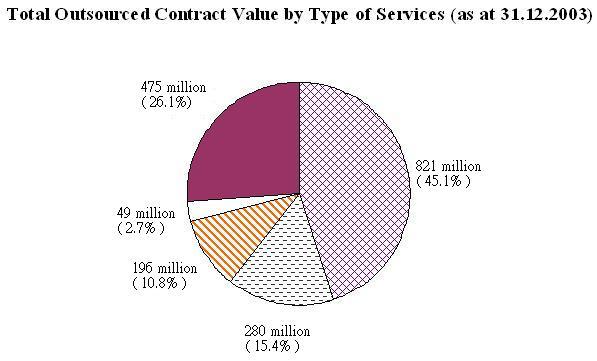
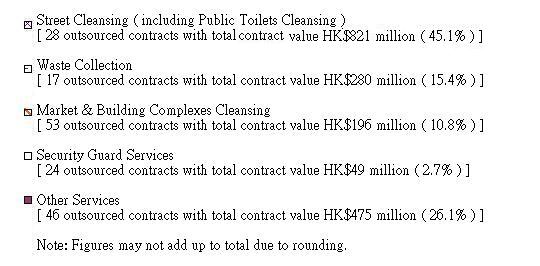
| Services Contracted Out | No. | $M |
|---|---|---|
| Street Cleansing (including Public Toilets Cleansing) | 28 | 821 |
| Waste Collection | 17 | 280 |
| Market & Building Complexes Cleansing | 53 | 196 |
| Security Guard Services | 24 | 49 |
| Other Services | 46 | 475 |
By the end of 2003, 168 contracts at a total contract value of $1,821 million were in force for the provision of services by private contractors. The outsourcing policy is aimed at greater cost-effectiveness and efficiency in the delivery of services.
Public market cleansing, street cleansing, waste collection, mechanical street sweeping, mechanical gully cleansing, building cleansing, security guard services, controlling mosquitoes in streams, animal carcass collection, cleansing and undergrowth cutting services for cemeteries and columbaria, and the collection of recyclables are examples of outsourcing services.
Measurable performance standards are written into the contracts to ensure the quality of the services provided. Protective clauses have also been included in tenders to safeguard the rights and benefits of workers. Supervisory checks are conducted to ensure compliance by contractors.
Complaints Management
The Complaints Management Section is responsible for formulating and reviewing policies on, and procedures for, handling all types of complaints. During the year, 132,703 complaints were received by the Department, including 131,342 relating to Departmental services.
The section conducts independent investigations into staff-related complaints other than those concerning crime, corruption, serious misconduct and dereliction of duties. In addition to taking immediate action on the complaints and replying to complainants, the section analyses the complaints according to their type, nature, causes, etc. to enable remedial or improvement measures to be taken.
Quality Assurance
Continuous improvement is one of the priority tasks of the Department to ensure provision of quality services to the public.
The Quality Assurance Section is mainly responsible for conducting day-to-day regulatory inspections on services provided by the Department, and where inadequacies in existing operational systems, procedures and guidelines are identified, making recommendations for improvement. The section also recommends good performers for Quality Assurance Awards to motivate meritorious and hardworking front-line staff.
The section is also tasked with investigating cases of dereliction of duty in an independent, objective and fair manner.
Public Education
Public education plays an important role in almost all the Department's activities and initiatives, forming part of an integrated approach to ensuring food safety and improving environmental hygiene.
To achieve this, the Department organises publicity and educational programmes, and arranges exhibitions, outreaching programmes and seminars.
The Department operates the Communication Resource Unit at the Public Health Laboratory Centre, 382 Nam Cheong Street, Shek Kip Mei and the Health Education Exhibition and Resource Centre in Kowloon Park to educate the public on the importance of food safety and environmental hygiene using interactive exhibits and library materials. Group visits and guided tours were provided to schools, voluntary agencies and the general public. Seminars and activities were conducted regularly. The centre attracted 146,481 visitors in 2003.
In addition, the centre has the task of implementing a two-year health education programme to spread general and specially selected messages about food safety and environmental hygiene.
In 2003, the centre organised many hundreds of talks and activities for kindergartens, primary schools and secondary schools, 957 talks for elderly centres, and 449 talks for new arrivals and members of the public. Audio-visual aids, question-and-answer sessions, demonstrations and games were used to enrich as well as to enliven the learning process.
Publicity campaigns launched during the year included a revitalised Clean Hong Kong Programme. Anti-rodent and anti-mosquito campaigns were also organised to solicit public support and participation in pest control.
In relation to food safety, comprehensive public education programmes were organised on Nutrition Labelling, Genetically Modified Food and Hazard Analysis and Critical Control Point. Food surveillance results were regularly released to help consumers make informed choices when buying food.
To cater for the specific needs of the food trade and the general public, seminars on restaurant licensing were arranged on a bi-monthly basis for those who had applied for food premises licences or were thinking of opening a food business. A Food Safety Seminar for the Trade was also organised to provide an opportunity for the interactive exchange of information and views on food related risk and management options among different sectors of the trade.
Clean Hong Kong Programme
The three-year Clean Hong Kong Programme was launched by the Government in December 2000 to address the environmental hygiene conditions of Hong Kong and to bring about improvements.
Enhanced Clean-up Action
In the wake of the SARS outbreak, the Government set up a special Team Clean task force in May 2003 to develop and take forward a series of proposals for entrenching a high level of public and environmental hygiene in Hong Kong. The Department was involved in spearheading the implementation of a wide range of environmental hygiene improvement measures, which include:
- cleansing and washing public places and over 100 environmental
blackspots; - cleansing and washing some 300 rear lanes and common parts of some 1,000 old tenement buildings and carrying out minor repair works and lime-washing;
- strengthening rodent and pest control services to prevent the spread of vector-borne diseases such as dengue fever; and
- cleansing markets, cooked food centres and hawker sites, and collecting refuse at on-street dumping spots.
Legislative Amendment and Enforcement
To increase the deterrent effect and stamp out unhygienic acts, the Government increased the fixed penalty for common cleanliness offences (i.e. littering, spitting, unauthorised display of bills or posters and fouling of streets by dog faeces) from $600 to $1,500. The new fee took effect from 26 June 2003 along with a new 'zero-tolerance' approach in law enforcement. In 2003, the Food and Environmental Hygiene Department issued over 17,000 fixed penalty notices (including notices of fixed penalty of both $600 and $1,500).
Publicity
Clean Hong Kong messages were disseminated to the public through television and radio announcements, posters and banners, advertisements on public transport and large-scale publicity functions. Educational efforts were also directed at various target groups e.g. tourists and road users.
Apart from organising talks at schools, the Department worked closely with the Education and Manpower Bureau to encourage students to actively participate in clean-up activities and projects aimed at enhancing their awareness of keeping Hong Kong Clean. Examples included the 'Clean Hong Kong Project Learning Competition' and the 'Adopt-a-Beach Scheme'.
Community and District Involvement
Community groups have been invited to organise activities to promote public awareness in keeping the environment clean. The Clean Hong Kong Funding Scheme run by the Department provided a maximum subsidy of $15,000 for each project. In 2003, 93 organisations were allocated funds to arrange activities. District Councils and District Clean Hong Kong Committees also organised 280 district promotional, educational and actual physical clean-up activities. In addition, some 3,500 voluntary helpers were appointed Clean Hong Kong Ambassadors and District Hygiene Squad members to help disseminate Clean Hong Kong messages and monitor district hygiene conditions.
The multi-pronged approach of the Clean Hong Kong programme has brought about visible improvements to the overall cleanliness of Hong Kong.





